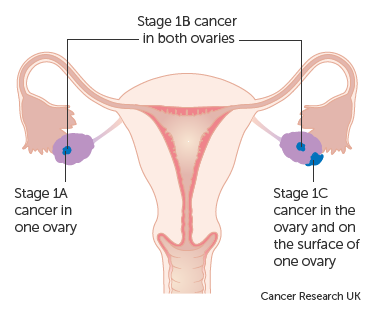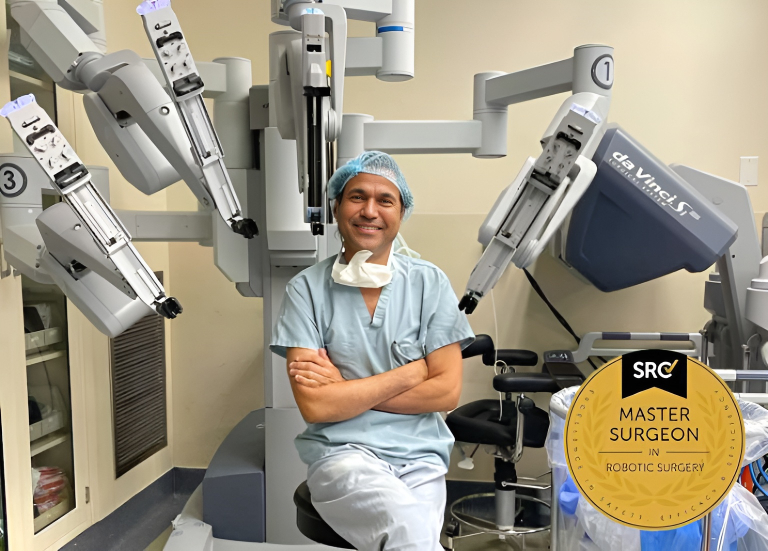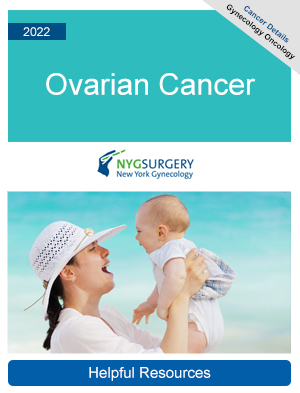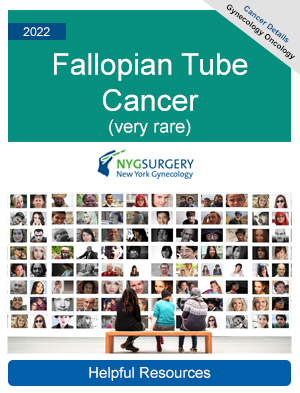Ovarian Cancer - Stage 1
What is Stage 1 Ovarian Cancer?
Stage 1 ovarian cancer refers to the earliest stage of ovarian cancer, where the disease is confined to the ovaries and has not spread to surrounding tissues or distant organs.
Stage 1A Ovarian Cancer: In this stage, the cancer is confined to one ovary and hasn’t spread to any other organs or tissues. The tumor is limited to the ovary and is generally smaller in size. The prognosis for Stage 1A ovarian cancer is often more favorable compared to later stages, as it is localized and more amenable to successful treatment.
Stage 1B Ovarian Cancer: At this stage, cancer has spread to both ovaries. Similar to Stage 1A, the cancer is still confined to the ovaries and hasn’t extended beyond them. The tumors may still be relatively small, and the prognosis is generally more positive compared to more advanced stages of ovarian cancer.
Stage 1C Ovarian Cancer: In this stage, the cancer has extended beyond the ovaries, but the spread is still limited to the pelvis. This can involve tumor growth on the surface of the ovaries, the fallopian tubes, or other nearby tissues within the pelvis. Lymph nodes in the pelvis may also be affected. While still considered an early stage of ovarian cancer, Stage 1C indicates slightly more advanced spread compared to Stage 1A and Stage 1B, and treatment might involve more comprehensive approaches such as surgery and possibly chemotherapy.

Image source: Cancer Research UK
It’s important to note that ovarian cancer staging also considers factors like the size of the tumor, the presence of cancer cells in the fluid around the abdomen, and the extent of spread within the pelvis. The stages provide critical information to guide treatment decisions and predict outcomes for patients with ovarian cancer.
Survival Rate for Stage 1 Ovarian Cancer
The 5-year survival rate for Stage 1 ovarian cancer is relatively high, with an approximate 89% survival rate, as the cancer is typically detected at an early stage and is more responsive to treatment.

Source: American Joint Committee on Cancer (AJCC) Cancer Staging Manual, 6th Edition
Symptoms of Stage 1 Ovarian Cancer
During Stage 1 of ovarian cancer, symptoms may be subtle or even absent. Common early signs can include bloating, abdominal discomfort, pelvic pain, and a feeling of fullness.
Women might also experience changes in urinary or bowel habits, such as frequent urination or constipation. While these symptoms are not exclusive to ovarian cancer and can be attributed to other conditions, their persistence and frequency, especially if new and unexplained, should prompt medical evaluation.
Since Stage 1 ovarian cancer often presents with mild or non-specific symptoms, regular health check-ups and awareness of any unusual changes in the body are crucial for early detection and timely intervention.
Causes of Stage 1 Ovarian Cancer
The causes of Stage 1 ovarian cancer, like other stages, are not fully elucidated, but they are often associated with a combination of genetic, hormonal, and environmental factors. Specific genetic mutations, such as alterations in the BRCA1 and BRCA2 genes, can elevate the risk of developing ovarian cancer in this stage. Family history of ovarian, breast, or colorectal cancers can also contribute. Hormonal factors, such as early onset of menstruation, late menopause, or never having been pregnant, may play a role.
Additionally, a history of endometriosis could increase the risk. While these factors might contribute to the development of Stage 1 ovarian cancer, it’s important to note that its causes can vary from person to person and may involve a complex interplay of influences.
Detection of Stage 1 Ovarian Cancer
Detecting Stage 1 ovarian cancer can be challenging due to the absence of specific early symptoms and the lack of effective screening tests. However, certain approaches can aid in early detection. Regular pelvic examinations and transvaginal ultrasounds can help identify any abnormal changes in the ovaries.
Additionally, monitoring tumor markers like CA-125, while not specific to ovarian cancer and prone to false positives, can sometimes indicate the presence of an ovarian abnormality. Genetic testing, especially for individuals with a family history of ovarian or breast cancer, can identify those at higher risk, potentially leading to earlier surveillance or preventive measures.
Treatment of Stage 1 Ovarian Cancer
Typically, individuals diagnosed with Stage 1 ovarian cancer usually undergo a comprehensive treatment regimen that includes a total abdominal hysterectomy, removal of both ovaries and fallopian tubes (known as a salpingo-oopherectomy), an omentectomy to eliminate the omentum (a fatty layer covering certain abdominal organs), as well as biopsies of lymph nodes and adjacent pelvic and abdominal tissues.
For women who desire to retain their fertility and have cancer confined to one ovary, a unilateral salpingo-oophorectomy may be performed without a hysterectomy, although other elements of the staging procedure remain intact. The necessity of further treatment hinges on the pathologist’s analysis of the excised tissue; if the cancer is deemed low grade, no additional treatment might be needed, but in cases of high-grade tumors, a combination chemotherapy might be administered to the patient.
Importance of Surgery in the Treatment of Ovarian Cancer
Surgery plays a pivotal role in the treatment of ovarian cancer due to its dual significance in diagnosis and therapy. A surgical procedure, often involving removal of the affected ovary or ovaries, fallopian tubes, and nearby tissues, enables accurate staging of the cancer’s extent and helps determine the appropriate treatment strategy.
Additionally, surgical debulking, which involves removing as much of the tumor as possible, is crucial in advanced cases. Surgery offers the chance to remove cancerous tissue and potentially achieve complete remission, and it is often followed by adjuvant therapies like chemotherapy.
NYGS Approach
We understand that an ovarian cancer diagnosis can be overwhelming and scary. Here at New York Gynecology Surgery (NYGS), we build our teams around you. Our expert oncologists will help guide you through this difficult time, answering any questions you may have along the way. We are here for you and will do everything in our power to meet your specific needs and exceed your expectations.
If you or a loved one is experiencing symptoms that may be related to cancer, please call us as soon as possible.
Pankaj Singhal, MD, MS, MHCM
- Industry expertise with over 12 years of experience in both academic & private health care settings, physician practice management and executive leadership.
- Trained over 45 gynecologic surgeons along with training fellows in minimally invasive gynecologic surgery and gynecology oncology, and has developed cutting edge, new surgical techniques for endometriosis and laparoscopic surgeries.
- One of the very few surgeons who have completed over 5,718 robot-assisted gynecologic surgeries in the entire United States.
- Known for taking on the most challenging surgery cases that other doctors/centers turn away.

Hear From Our Clients

Joetta Simonette
On May 3, 2018 at Good Samarital Hospital, due to cancer, you performed ovarian surgery on me.
It is now 5 years since that date – 5 years of wellness that has been accomplished through the grace of God guiding your hands and the support of your team and my loving family.
You are an excellent, compassionate and caring doctor who was confident of a good outcome, and so it is!
Thank you, thank you for these past wonderful years. May God continue to bless you. You are in my prayers!

RG Petkos
Power couple Dr. Singhal & Dr. Mclean are amazing!! My experience with them has been absolutely wonderful. I highly recommend either of them for so many reasons mainly for helping me get back some quality of life with my successful full hysterectomy being better than I expected.
The process from the beginning with them was a pleasure and I had quite a challenge beforehand so I’m very grateful that quality, professional, caring doctors still exist!!
I especially appreciate their proactive approach and feel the combination of the care and expertise they provide make for successful outcomes!!

Kimberly Quinde
Dr. Singhal was the doctor who took care of my mother Ivonne Guevara. My mother had gone to 2 other doctors who refused to take care of her fibroid. She was in pain for years and her fibroid had grown really big without her knowing. When my mom went to Dr Singhal she was met with calmness and reassurance that everything will be ok and he would help her get better. Dr. Singhal was so kind and caring all throughout the process.
He took all her worries away and my mom highly recommends him. She hopes every doctor can be as great as Dr. Singhal.
Everyone in his office was so nice to my mom and it was a great experience given the circumstances.
Hospital Affiliations



Request an Appointment
"*" indicates required fields






